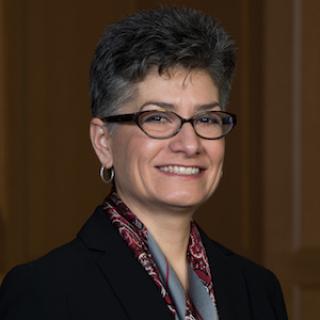

Assistant Provost
Office of Diversity and Inclusion
My career path has followed a fairly steady course with very generous supervisors and mentors along the way who encouraged me to the next step. I started my higher education career as a graduate assistant and within a few years, I was appointed assistant dean in the unit where I worked. In that role, I collaborated with an organization outside of the university, eventually taking a position in that organization. Each position enabled me to develop relationships with new colleagues who opened doors to the next opportunity.
I value the Servant Leadership approach and try to give priority to the needs of my team members. I am fortunate to work with very talented and highly motivated colleagues who can do amazing things when they have what they need. Thus, it is important to me to be accessible and responsive to my team, and to foster a community built on trust and respect among our team and with our stakeholders.
There have been a couple of points in my career when I uprooted, sold my home, left a secure position for a new, uncertain opportunity in a new, unfamiliar place. Big opportunities usually come with some degree of risk, and always involve a degree of vulnerability as you stretch and grow. But as I noted before, each time I asked a lot of questions and sought the counsel of experts. Then I followed my instinct. Each move has opened new doors and expanded my professional horizons.
All along the way, I have had the good fortune to be connected with champions who nudged me to reach a little (or a lot) farther than my current expectations. It started with my high school counselor who pushed me to go away to college, and throughout my career supervisors along the way have entrusted me with responsibilities that I didn’t know I could manage. I knew very little about higher education when I got my first appointment, but at each stage in my career I have cultivated relationships with others who knew more, had access to broader arenas and opened doors for me.
My career goals have always been flexible. I feel very fortunate to contribute to the mission of higher education, and to work with interesting and very smart people who are passionate about what they do. Early in my career, it was important to engage in broad areas of university life, and I sought opportunities in a number of different administrative areas.
I resisted the temptation to get involved only in diversity work despite the fact that I felt most confident and valued in these circles. I did not want to prematurely pigeon-hole my career, and I needed to learn to navigate different institutional cultures. Throughout my career, however, I have looked for ways to promote diversity and inclusion, and to be connected with communities of color.
Today, with the benefit of an expanded understanding of university life and a broad network of colleagues, I am very happy to stand with both feet in the Office of Diversity and Inclusion. My career goals are focused on pushing Ohio State to become the national leader at the forefront of diversity and inclusion in higher education.
There have been a few times in my career when I recognized that I did not have what I needed to be successful. Generally, in each case my goals and the priorities of my primary stakeholders had drifted out of alignment. In those moments, I reached out to others to help me better understand the situation. Usually, I was able to revise my goals or priorities to better fit with my stakeholders’, but there have been times when I recognized that role was no longer a good fit and I needed to realign my responsibilities or seek a better fit elsewhere.
I had just started a new job as an assistant director and on the second day, I attended a meeting of senior university officials. I sat quietly through the meeting, taking notes and listening. At one point, around mid-day, the chair looked up at me and said, “You there, you’ve been lurking around all morning. Why don’t you go make copies of this document?” I think I was stunned at the dismissiveness in his voice, and today I am still not quite sure what I actually felt. Fortunately, instances of such blatant and open condescension are very few in my experience.
My advice to women is to have a good understanding of your strengths, motivations and values. Know where you can be flexible and know what is not negotiable. Then find opportunities to show off your best stuff. If your current responsibilities don’t let you fully shine, find other ways to engage your talent and make a positive impact. Equally important is to be a good colleague, support the success of those around you. When we help one another grow and achieve, we are growing the capacity of our networks to support our own success.
Over the past couple of years, I have worked closely with a colleague on ways to support Latino student success at Ohio State. Through our conversations, we decided that we needed to carve out some space for thinking beyond the boundaries of our current roles. So, we have committed to meeting for periodic “mini-retreats” where we spend a day brainstorming about Latino education needs, best practices and opportunities.
Learn more about Yolanda and her career path in her Buckeye Voices article.


